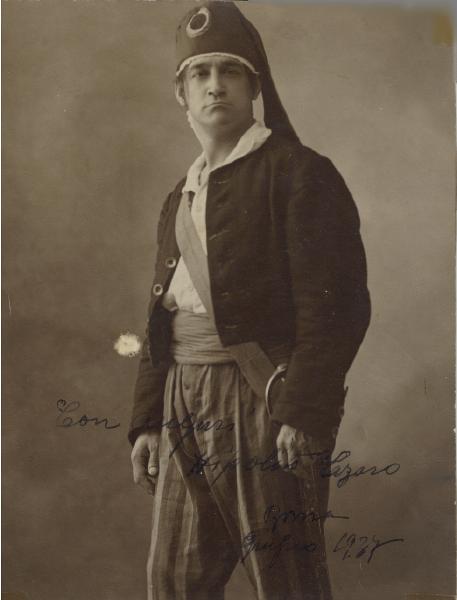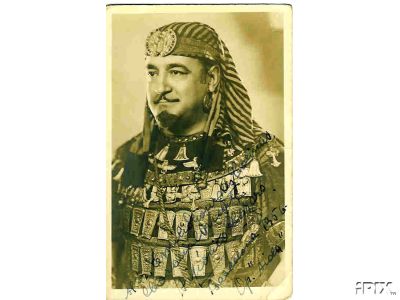Hipólito Lázaro
14 September 1887 Barcelona – 14 May 1974 Barcelona
In RA format
In RA format
This fantastic recording – Lázaro at his very best – has always remained a mystery to me:
how come that Lázaro recorded in Yiddish, of all languages totally improbable for a poor Catalan boy?! And his Yiddish diction is
even good!
In RA format
In RA format
1959 live recording, at 72 years old!!! How many 30-year-old sound like this today?
Lázaro came from a miserable family – economically miserable, and terrorized by a drunken father, who used to batter wife and
children. Hipólito started working in a factory at age nine. After his mother had died, nothing could keep him in a home where he had
never felt at home, and he ran away: he was ten and a half. He soon found his first profession: as a carter.
He had always loved to sing, and once, patrons even paid for a few voice lessons that Lázaro could take with a serious teacher; but of
course, his economic situation made continuous vocal studies inconceivable. But Lázaro was smart: he enrolled in the army so as to sing
in a military band. And it worked; not only could he now make singing his profession, the army even paid for his training with conservatory
teacher Lluís Blanch! In summer 1907, he sang on stage for the first time: organized by his comrades, the Teatre Principal in Olot staged
Bohemios and Marina with the young soldier. The Teatre Bosque in Barcelona wanted to star him as Fernand, when the army detailed
him to Morocco: Spain waged war against the Berbers in the Second Melillan campaign (1909), and Lázaro had to sing so as to lift up his
company's spirits. It was a dire war, and many young soldiers died. With the unlikely help of a newspaper war reporter who happened to be a
melomaniac, Lázaro was allowed to return to Spain, and to his vocal training.
He sang Fernand eight months late, in March 1910, and at the Teatro Novedades instead of the Bosque. He was successful, and immediately engaged
to Valencia for the whole season; back to Barcelona, he sang at the Tívoli and Gran Via theaters, and on the Prado Catalán de
Gracia (open air): he was the talk of the town. But again, he proved to be smart: he knew that he still had a lot to learn, and went to Italy
for further studies. First of all, he was highly successful as Duca in Ferrara and Padova, and as Enzo Grimaldo in Treviso. Then he stayed in
Milano, where he found his definitive voice teacher in Ernesto Colli.
His further career in Italy, however, was hampered by the fact that he refused to be represented by any artist agent – particulary one of
the agents that worked for the influential music publisher Tito Ricordi. His contract to sing Rodolfo at the Teatro Dal Verme in Milano was
aborted ahead of time, and it proved impossible to find any other engagements.
So in July 1911, he went to the UK and appeared in London (in vaudeville) and Manchester. To avoid further trouble with Ricordi, he now called
himself Antonio Manuele. And as such, he returned to Italy, and jumped in for Alessandro Bonci
as Duca at the Teatro Costanzi in Rome on 7 December 1911. He was a sensation. In early 1912, he went on tour to Cairo and Alexandria with a
British troupe, then to London for another Rigoletto production that brought him under the wings Ricordi's Italian competitor Renzo
Sonzogno. And so he could return to using his real name... Back to Italy, he made another important debut, at the Carlo Felice in Genova,
again as Duca. Now even Ricordi wanted to audition him, but it did not turn out well, and ended in a tough face-off.
During the Rigoletto rehearsals in Genova, Lázaro got to know Pietro Mascagni, who was thrilled by the tenor, and hired him for his
Isabeau, again in Genova, and for the world premiere of Parisina at La Scala (15 September 1913). A lot of performances at the
Teatro Costanzi was next, then a South American tour, all in 1914; and on 14 November 1914, Lázaro made the most coveted debut of his
life, at the Teatre del Liceu in his native Barcelona (as Duca, what else?). It became the pivotal theater of his career.
In 1915, too, he was in Italy: at La Scala, in Rome, in Naples. Then he went on a long tour all over Latin America: Argentina, Cuba, Brasil,
Mexico, among others. In São Paulo, he sang Arturo, complete with the high F in "Credeasi, misera". The tour lasted into late 1917. On 31
January 1918, Lázaro made his Met debut (as Duca...) – another huge sensation. He stayed in the US (at the Met and elsewhere) until
1920, with excursions to Mexico City and Havana.
In 1921, Mascagni made him return to Italy for the world premiere of Il piccolo Marat (Rome, 14 April 1921): enormous success. Winter
1921/22 was spent in Spain, both at the Liceu and (for the first time) at the Real in Madrid. Much of 1922, Lázaro was in Argentina and
Brasil, and towards the end of the year, back at the Liceu. In 1923, he sang in Spain (Madrid, Valencia, Sevilla, San Sebastián) and Cuba.
In June 1924, he gave a concert at Carnegie Hall in New York City. 20 December 1924, another world premiere at La Scala: Giordano this time,
La cena delle beffe. In 1925, he sang at three Barcelona theaters (Liceu, Tívoli and Olympia), in Bologna and Rimini, and once more
in Egypt. Throughout 1926, he was in Spain; in 1927, in Italy (Venice, Florence, Naples), then in Latin America until June 1928 (Cuba, Panama,
Colombia, Puerto Rico, this time). In 1928, Lázaro sang at three Paris theaters (Opéra, Gaîté-Lyrique,
Champs-Élysées), in Florence, Budapest and Barcelona. It was the last year in which he seriously traveled abroad. A few appearances
in Italy and Portugal (Palermo, Arena di Verona, Genova, Lisbon) followed in 1929, 1930 and 1933, but otherwise, he appeared exclusively in
Spain now. Why, I have no idea; that the voice had not suffered the slightest bit is evidenced by the above 1959 (!) live recording, where he
still sounds like fresh from the spring. He sang above all at every possible Barcelona theater, but also in Madrid (Teatro Calderón) and
Sevilla, now both opera and zarzuela.
In the Spanish Civil War (from 1936), the anarchists, whose stronghold Barcelona was, drafted most artists to sing at the events that their
Theatrical Comitee organized; Lázaro had to sing extremely often, almost daily and sometimes even twice a day. His family had fled to
Cuba, but he had to surrender his passport and stay. And sing. Only after two years, in June 1938, he was allowed to join his family in Cuba.
He sang now in Havana; in 1939, he was back to Buenos Aires (Teatro Avenida), in 1940 to New York (two concerts at Town Hall), and in 1942 to
Mexico City.
In 1944, the Spanish Civil War was over and had ended with the defeat of all progressive forces by Franco's fascists, the Liceu wanted
Lázaro back, and he gladly obliged and sang Radamès in December, Duca and Jorge (Marina); Madrid and Lisbon followed, then he went
home to Cuba. From June 1946, he stayed in Barcelona for more than one year, singing at various theaters and also in Valencia. Then he lived in
Cuba again, still giving the occasional performance, the last ones in April 1950 at the Palacio de los Deportes in Havana. His very last opera
performance was – Rigoletto, of course.
From 1952, he lived permanently in Barcelona, while retaining his considerable Cuban possessions – which were confiscated in 1961 and 1962
after Fidel Castro had taken power: Lázaro was left completely impoverished, and had to teach voice for the rest of his life. He received
a phone call from Fidel Castro in person, who offered to give Lázaro's properties back in exchange for a joint Lázaro/Castro
outing. Lázaro did not even discuss it and hung up.
Reference: the fantastic website Interprets Catalans Historics
Repertory
Bohemios – Olot, summer 1907
Marina – Olot, summer 1907
La favorite – Barcelona, 26 March 1910
Rigoletto – Valencia, 1910
L'Africaine – Valencia, 1910
Tosca – Palma de Mallorca, 1910
Il trovatore – Valencia, 1910
Carmen – Valencia, 1910
Aida – Valencia, 1910
La Gioconda – Treviso, 11 March 1911
La bohème – Milano, June 1911
Iris – Alexandria, 12? February 1912
Isabeau – Genova, 14 January 1913
I promessi sposi (by Ponchielli) – Genova, 8 March 1913
Parisina – Milano, 15 December 1913 (world premiere)
La fanciulla del West – Buenos Aires, 13 June 1914
Cavalleria rusticana – Rio de Janeiro, 22 July 1914
Tannhäuser – Rio de Janeiro, 5 August 1914
Faust – Roma, 23 January 1915
Fedra (by Romani) – Roma, 3 April 1915
Francsesca da Rimini – Buenos Aires, 18 May 1915
Manon – Buenos Aires, 10 July 1915
La traviata – Rio de Janeiro, 9 October 1915
I puritani – Porto Alegre, 14 November 1915
Pagliacci – La Habana, 4 January 1917
La reine Fiammette (by Leroux) – New York, 24 January 1919 (world premiere)
Lucia di Lammermoor – La Habana, 29 May 1919
Madama Butterfly – New York, 14 April 1920
Il piccolo Marat – Roma, 2 May 1921 (world premiere)
La Dolores – Buenos Aires, 25 June 1922
L'elisir d'amore – Buenos Aires, 2 August 1922
Les huguenots – Barcelona, 23 December 1922
Yolanda (by Arregui) – Madrid, 10 February 1923 (world premiere)
La cena delle beffe – Milano, 20 December 1924 (world premiere)
Curro Vargas (by Chapí) – Madrid, 1932
Doña Francisquita – Barcelona, 1933
La tempestad – Barcelona, 1933
Don Gil de Alcalá (by Penella) – Barcelona, 1933
La dolorosa – Barcelona, 1933
Euda d'Uriach (by Vives) – Barcelona, 1934 (world premiere)
El estudiante de Salamanca (by Gaig) – Barcelona, 1935 (world premiere)
Baltasar (by Villate) – La Habana, 1939
Kabelia (by Sánchez Fuentes) – La Habana, 22 June 1942 (world premiere)
I would like to thank Thomas Silverbörg for the recordings (Eili eili, Cuore infranto, Trovatore, Piccolo Marat).
Source for the Plegaria recording: Youtube channel "Dead Tenors' Society"
I wish to thank Tom Kaufman for a copy of his unpublished chronology on Lázaro.
Further references for the repertory: TIMAClub LP booklet "Hipólito Lázaro"; Hipólito Lázaro, El libro
de mi vida, La Habana, 1949 (1st edition), Madrid, 1968 (3rd edition); Ramón Sabatés, Hipólit Lázaro,
Barcelona, 1987
|

